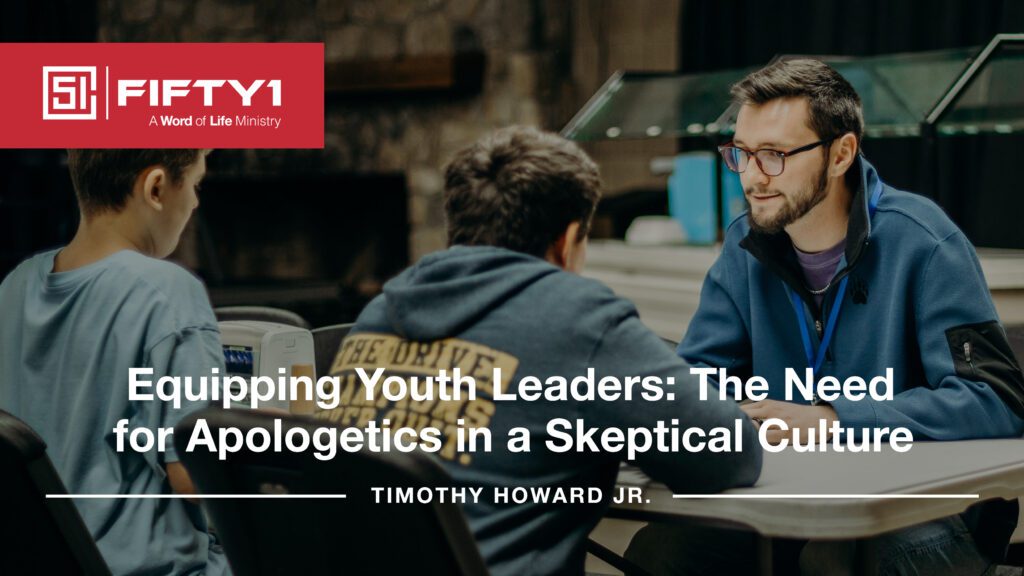We live in very skeptical culture. Everything is questioned. Pontius Pilate’s words, “What is truth?” (John 18:38), seem to be our culture’s motto. It has become the norm today for people to scrutinize and critically evaluate everything, from our societal institutions to morality, to identity, and even reality itself.
Considering this, as it relates to youth ministry, leaders face an amazingly vast and unique task. They are called by God not only to shepherd and care for the spiritual growth of those in their care, but to prepare young people to engage with the complexities of maintaining their Christian faith in an increasingly skeptical and indeed secular, society.
Within this context of skepticism, Christian apologetics, or the defense of the Christian faith, plays a vital role. The Apostle Peter wrote in 1 Peter 3:15: “Always be prepared to make a defense to anyone who asks you for a reason for the hope that is in you; yet do it with gentleness and respect.” (ESV)
This verse is the cornerstone for youth leaders who are struggling to navigate the rough waters of the culture of skepticism found in the lives of today’s youth. However, when understood and applied properly, this verse can help bring encouragement to youth ministry leaders, as well as practical wisdom in equipping their kids to defend the faith in a way that honors God.
Breaking this verse down, we see several key applications regarding our approach to Christian apologetics.
1. Be Prepared
First, we notice Peter’s stressing of the importance of being “prepared.” Therefore, being proactive in their engagement with potential questions and objections concerning the Christian faith is imperative for the youth leader. This preparedness should include both a solid grounding in the Bible and sound doctrine, as well as an informed grasp of contemporary issues and perspectives that may be presented as a challenge to those teachings. In other words, youth leaders need to be experts in the Bible and theology but also well-versed in what is going on in the world. Both are very important and relevant to apologetic preparedness.
2. Be Reasonable
The verse also goes on to emphasize the need for a logical and rational defense of the faith, which shows that Christianity and human reason are not incompatible but rather harmonious. In this skeptical culture that often characterizes faith as something that defies human reason, by being prepared with a proper, biblical, and logical defense, youth leaders can model how faith can be intellectually consistent and cohesive. In other words, when the youth leader can make a well-thought-out and well-articulated argument for the Christian faith, they will help their students defend their beliefs with confidence.
3. Be Gentle and Respectful
We see a very important caveat at the end of the verse, specifically regarding the attitude of the apologist, namely that this “defense” should be made with “gentleness and respect.” In the apologetic world, it can be all too easy for debates to devolve into intellectual wrestling matches void of any kind of compassion or empathy. Yet, according to this verse, real apologetics happens not only through good argumentation but also through the character of the Christian who is defending the faith.
Youth leaders must, therefore, teach their kids to remain humble and compassionate as they defend the faith, understanding that every question or objection is rooted in a real person who needs to hear the gospel. The relational aspect of apologetics should never be ignored. The defense of the faith is not just about winning arguments – it is about winning souls. Youth leaders are called not only to provide answers but to love these kids as they wrestle with doubts and uncertainties and teach them to do the same.
In summary, the task of apologetics in youth ministry is one that is daunting indeed, but one that every youth ministry leader should take seriously. Youth leaders must always be ready by delving deep into the Word of God, studying and knowing their theology, and staying updated and informed about their culture while always seasoning their defense of the faith with gentleness and respect. As youth leaders strive to do these things, may God bless our churches with a generation that is up to the task of apologetics.
Timothy Howard Jr. is the pastor of Eastford Baptist Church in Eastford, CT, as well as a professor and faculty member of Davis College in Pottersville, N.Y. He is a graduate of Clarks Summit University with a Bachelor of Science in Bible, a Master of Arts from Baptist Bible Seminary, PA, in Biblical Studies, a Master of Divinity from the Southern Baptist Theological Seminary in Christian Ministry, and is currently working on a doctorate. He has been married to his wife, Sarah, for 14 years and has been blessed with three amazing kids – Karissa, T.J., and Trinity.

